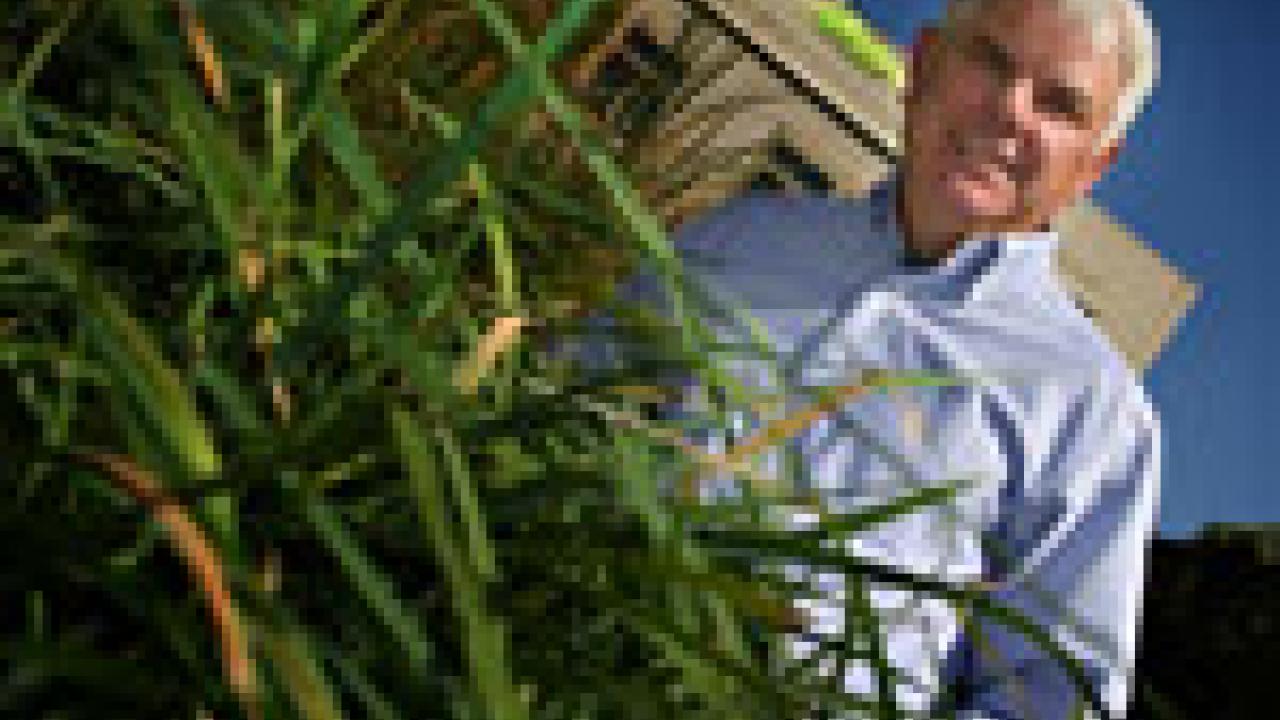His cowboy boots are shiny and clean today, but this is no normal day for Mel George.
For one thing, he is on campus. Many a day you can find him out in the field — home on the range, so to speak — all around California, with mud on his boots, doing what he does best: managing rangeland for maximum productivity and minimum environmental impact.
His specialty in recent years has been water management: keeping livestock waste out of streams, rivers and reservoirs.
In recognition of his work, the UC Davis Academic Federation selected George as this year's recipient of the James H. Meyer Distinguished Achievement Award, the federation's highest honor — named after a former UC Davis chancellor. The award comprises a $1,000 check and a framed certificate.
"This is a big deal because the people that you work with select you for this award," George said one day recently at the Plant and Environmental Sciences Building, where he maintains his office.
Indeed, Department of Plant Sciences Chair Chris van Kessel, in his letter nominating George for the Meyer award, called him "a national and international leader in the science and management of rangelands."
The Academic Federation comprises some 1,200 people in all, including lecturers, researchers, writing program teachers, Cooperative Extension specialists, academic administrators and academic coordinators.
George came to UC Davis 29 years ago. He works for UC Cooperative Extension, and is a member of the Department of Plant Sciences.
He earned a bachelor's degree in animal science at California State University, Chico; a master's in range management at Texas Tech; and a doctorate in range ecology at Utah State.
After nearly three years on the faculty at California Polytechnic State University, San Luis Obispo, he came to Davis. "I ran around a lot and accidentally ended up back here, not far from Gridley where I grew up," George said.
He said his father always had a great garden, and eventually started growing kiwis commercially. As for Mel, he said he knew from an early age that he wanted to raise animals and take agriculture courses. He would find out later in life, as a genealogy buff, that farming is in his blood going back 15 generations.
He joined Future Farmers of America at Gridley High and raised animals — but his career path would not lead him to become a farmer or a rancher. Instead, during his senior year at Chico State, a new professor interested him in range management — and that led him to Texas Tech for graduate work.
"They had a new grant for brush control, trying to kill mesquite," he said. "Everyone who's ever worked in brush control in Texas has tried to kill mesquite. It doesn't work!"
That does not mean that George has not been successful in range and pasture improvement, using his knowledge of botany, physiology and ecology.
In his nomination letter, Van Kessel went to great lengths describing George's work on environmental issues associated with the impact of grazing on water quality.
The department chair said George has developed effective approaches to managing rangeland and protecting water quality — approaches "that have impacted millions of acres of rangeland in the U.S., Africa, Europe and China."
George developed a short course program 10 years ago to help ranchers develop water quality plans. In California alone, more than 1,000 ranchers have participated — and their land holdings total some 2 million acres.
"We try not to fence the land," said George, noting that ranchers oppose fencing, and so do people who use open land for recreation.
Instead, George promotes better management — things as simple as limiting the amount of time that grazing cattle may spend at a stream. "It turns out cows would much rather drink clean water out of a trough," he said.
Another management tool is something George calls "cow candy" — a protein supplement put out in barrels. Cattle like to lick the "candy," and it keeps them away from streams.
The goal is clean water from river to reservoir. Streams sullied by livestock waste can introduce pathogens and nutrient overload in reservoirs, many of which provide drinking water for people.
Van Kessel noted how George developed a policy framework based on scientific and community participation, encouraging voluntary compliance on this critical issue — "in essence, the ideal performance of a UC Cooperative Extension specialist."
George is particularly proud of his working relationship with ranchers. "Because the ranching community knows and trusts me, I can describe grazing impacts and get away with it," George has been quoted as saying, "whereas if a local fish and game biologist tried to do it, he might get strung up."
An Academic Federation dinner in George's honor is set for 6 p.m. Nov. 5 in the AGR Room at the Buehler Alumni and Visitors Center. For information on attending, contact Edwin Arevalo, (530) 754-7468 or emarevalo@ucdavis.edu.
Media Resources
Clifton B. Parker, Dateline, (530) 752-1932, cparker@ucdavis.edu
